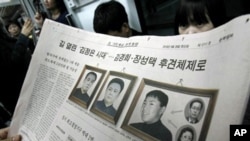The Korean Workers' Party conference in Pyongyang this week has elevated leader Kim Jong Il's son to a senior position in the ruling Communist party, which is considered a step closer to succeeding his father.
Officials keep the succession process intentionally murky, making it nearly impossible for outsiders to discern exactly what is going on. But other announcements at the meeting have led observers to believe that the real force behind the country's next leader may actually be Kim Jong Il's sister and brother-in-law.
Roots of a Family Dynasty
Kim Kyong Hui and Jang Song Taek are as close to reclusive leader Kim Jong Il as one can get. For Kim Kyong Hui, Kim Jong Il's sister, experts say the bond was sealed at a young age, when their mother died. They are the only children of the first wife of North Korea's founder, Kim Il Sung.
Trust comes from family ties in North Korea, says Choi Jin-wook, a senior fellow at Seoul's government-run Korean Institute for National Unification.
"Kim Kyong Hui was very young, maybe four years old when her mother was dead, and Kim Kyong Hui and Kim Jong Il were only two siblings and they have been very close since that time," he says. "Kim Jong Il really loved her and they are very, very close because they grew up very lonely, so they are very close."
Sixty-four year-old Kim Kyong Hui is rarely heard from, but this week, she was elevated to the rank of army general and handed full membership of the Workers' Party Political Bureau. Her husband, Jang Song Taek, is considered Kim Jong Il's number two. He is vice-chairman of the National Defense Commission and, now, an alternate member to the Political Bureau.
Andrei Lankov, a specialist on North Korea, says it appears Kim Jong Il has designated the couple to help his young, inexperienced son, Kim Jong Un, prepare for his new leadership role.
"It seems likely that his uncle and aunt will become, in case of Kim Jong Il's sudden death, will become sort of prince-regent and princess-regent, says Lankov. "That is people who will be running the country and will be making actual decisions."
The Changing Fortunes of Jang Song Taek
Some North Korea analysts say Kim Jong Il's brother-in-law was not always so trusted. In 2004, he mysteriously disappeared from public for a year-and-a-half. Ryoo Kihl-jae, a scholar with the Woodrow Wilson International Center for Scholars in Washington, says Jang Song Taek fell victim to political infighting - temporarily.
"He was expelled to the low, miserable, humble position. He was re-emerged to a high-ranking position and when Kim Jong Il had a stroke, he rose higher," says Ryoo.
In his return to power, Jang Song Taek reportedly became a trusted confidant and drinking buddy to Kim Jong Il.
North Korea's leadership keeps its personal and political affairs private, so analysts rely on defectors' stories and practiced guesswork to interpret any changes. Choi Jin-wook believes Jang Song Taek was purged because he had personal connections with his followers, breaking an unspoken rule in North Korean politics.
"That cannot be tolerated in North Korea's political system," Choi says. "Kim Jong Il is supposed to be the only leader which controls the country. But Jang Song Taek played a more active role. And Jang Song Taek was followed by many people in the party and in the government and in even the military, so he was purged."
Korea analyst Ryoo says it was the charisma that gained Jang Song Taek followers in government that also won his wife's hand.
"They met as college students, and at that time, [he] was very popular among the girls. He can sing a song very well and he is humorous and he is rather handsome," says Ryoo.
According to some observers, it was a forbidden love. The story goes that Kim Kyong Hui's father, Kim Il Sung, forbade his daughter from seeing Jang Song Taek and banished him from the capital. But observers say Kim Kyong Hui, reportedly stubborn and hot-tempered, pursued her boyfriend and eventually married him.
Tensions in Leadership Transition
But Lankov scoffs at such stories as mere fantasy. He prefers to stay away from analyzing their marriage and looks instead at the relationship between young dynastic leaders and their regents. He says historically, these are tense partnerships and North Korea likely will be no exception. Still, he says, North Korean leaders understand that unity is key to the country's survival.
"They have to hang together; otherwise they will be hanged separately."
The current Workers' Party conference is the first public test of the leadership's unity. But analysts say the real test will not be the tensions within the family, but between North Korea's ruling party and the military.




